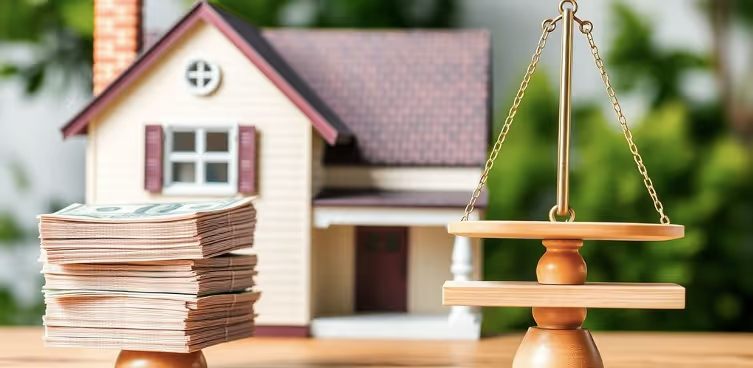Second Mortgage vs. Home Equity Loan: Understanding Your Options
November 19, 2025
A second mortgage allows you to borrow against your home’s equity, while a home equity loan is a specific type of second mortgage that gives you a lump sum with a fixed interest rate. Both options come with risks, including the potential for foreclosure if payments aren’t made, but they offer flexibility for using your home’s value to cover expenses.

Thinking about using your home's value to get some cash? You might have heard terms like "second mortgage" and "home equity loan" thrown around. They sound similar, and sometimes people use them interchangeably, but there are some real differences. Knowing what each one is all about can help you pick the right option for your situation. We'll break down what makes a second mortgage different from a home equity loan, and which one might be a better fit for your financial needs.
Key Takeaways
- A second mortgage is a loan you get using your home as collateral, in addition to your main mortgage.
- A home equity loan is a specific type of second mortgage, giving you a lump sum of money.
- Second mortgages can be riskier because if you can't pay, your home is on the line.
- Home equity loans often have fixed interest rates, making payments predictable.
- Both options let you use your home's equity, but how you get the money and how you pay it back can be very different.
Understanding a Second Mortgage

Defining a Second Mortgage
A second mortgage is a loan you take out on a property that already has a primary mortgage. It's essentially borrowing against the equity you've built up in your home. The amount you can borrow depends on how much equity you have and the lender's assessment of your ability to repay. The second mortgage is subordinate to the first, meaning that in case of foreclosure, the first lender gets paid before the second.
How a Second Mortgage Works
You're using your home as collateral. The lender assesses your home's value and how much you still owe on your first mortgage. The difference is your equity, and a portion of that can be borrowed. The process is similar to your first mortgage: application, appraisal, and approval. Once approved, you receive the funds and start making monthly payments, usually with interest. Keep in mind that if you fail to repay, the lender could foreclose on your home. It's a serious commitment, so make sure you can handle the extra debt.
Risks of a Second Mortgage
Taking out a second mortgage comes with significant risks. The biggest risk is foreclosure if you can't keep up with payments. Since the second mortgage is subordinate, lenders often charge higher interest rates compared to the first mortgage. Also, you're increasing your overall debt, which can strain your finances. Defaulting on the loan could mean losing your home, so it's not a decision to take lightly. It's a good idea to speak with a financial advisor before making any decisions.
Exploring a Home Equity Loan
Defining a Home Equity Loan
A home equity loan is a type of second mortgage. You borrow a lump sum of money and repay it over a fixed period, with a fixed interest rate. Think of it as a traditional loan, but secured by your home. The amount you can borrow depends on your home's value and how much equity you have.
Calculating Your Home Equity Loan Amount
To figure out how much you can borrow, lenders typically look at your loan-to-value (LTV) ratio. Here’s how to calculate it:
- Get your home appraised: Let’s say your home is appraised at $300,000.
- Determine the maximum LTV: Many lenders allow you to borrow up to 80% of your home’s value. So, 80% of $300,000 is $240,000.
- Subtract your existing mortgage balance: If you owe $150,000 on your mortgage, subtract that from $240,000. That leaves you with $90,000.
So, in this case, you could potentially borrow up to $90,000 as a home equity loan.
Common Uses for Home Equity Loans
Home equity loans can be used for various purposes, such as:
- Home improvements: Renovating your kitchen, bathroom, or adding an addition.
- Debt consolidation: Paying off high-interest debt like credit cards.
- Large expenses: Covering medical bills, education costs, or other significant expenses.
It’s important to remember that while a home equity loan can be helpful, it’s still a loan that needs to be repaid. Failing to make payments could result in foreclosure, so it’s crucial to borrow responsibly and only what you can afford to repay.
Key Distinctions: Second Mortgage vs Home Equity Loan
Terminology Differences
A home equity loan is a type of second mortgage, but not all second mortgages are home equity loans. Second mortgages are a broader category that includes things like HELOCs (Home Equity Lines of Credit). A home equity loan is specifically a lump sum loan, while a HELOC operates like a revolving credit line.
Disbursement Methods
With a home equity loan, you get all the money upfront in a lump sum. This is ideal if you have a specific, one-time expense. In contrast, second mortgages like HELOCs offer a line of credit, allowing you to borrow as needed, up to a certain limit. This can be beneficial for ongoing or uncertain expenses.
Interest Rates and Terms
Home equity loans usually have fixed interest rates and set repayment schedules, making them predictable for budgeting. HELOCs, on the other hand, often have variable interest rates, meaning your payments can fluctuate based on the market. Variable rates may be lower initially, but they can increase, making payments less predictable.
Shared Characteristics of Second Mortgages and Home Equity Loans

While there are key differences, second mortgages and home equity loans share a few things in common:
- Leveraging Home Equity: Both let you borrow against the equity in your home.
- Secured Nature of Loans: Since these loans are secured by your property, failure to repay can result in foreclosure.
- Potential Tax Benefits: In some cases, the interest on these loans may be tax-deductible. However, it’s essential to consult a tax advisor to ensure eligibility.
Who Benefits from a Second Mortgage or Home Equity Loan?
Homeowners with Sufficient Equity
Both loan options are ideal for homeowners who have built up significant equity in their homes. If you’ve paid off a good portion of your mortgage, you’re in a better position to qualify for these loans.
Those Seeking Predictable Payments
If you prefer having a fixed monthly payment and knowing exactly what you’ll owe, a home equity loan might be the better choice. Second mortgages with variable rates can result in fluctuating payments.
Individuals Needing Flexible Funding
If you need flexibility, a second mortgage (like a HELOC) offers access to a line of credit, which you can draw from as needed. This is beneficial if you’re unsure about the exact amount of money you’ll need over time.
Applying for a Second Mortgage or Home Equity Loan
Assessing Your Financial Situation
Before applying, evaluate your finances by:
- Reviewing your income and expenses.
- Checking your credit score.
- Calculating your debt-to-income ratio.
- Determining how much equity you have in your home.
Comparing Lender Options
Don’t settle for the first lender you find. Shop around, compare rates, fees, and terms, and read the fine print to ensure you understand all the costs involved.
Seeking Professional Advice
If the process feels overwhelming, consider seeking advice from a financial advisor or mortgage broker. They can help you navigate the loan options and find the best fit for your financial goals.
Advantages of Home Equity Loans
Home equity loans can be an excellent way to access cash for big expenses, with the benefit of lower interest rates compared to other types of loans. Key advantages include:
- Lower Interest Rates: Generally lower than credit cards or personal loans due to being secured by your home.
- Lump Sum Disbursement: Ideal for one-time expenses like home renovations.
- Tax Deductible Interest: In some cases, the interest may be tax-deductible, but consult a tax advisor to confirm.
Wrapping It Up
When considering a second mortgage or home equity loan, it’s important to understand the differences and make sure you choose the option that aligns with your financial needs. Take your time to evaluate the pros and cons, understand the risks, and seek professional advice before making a decision.
Frequently Asked Questions
- What is a second mortgage?
A second mortgage is another loan taken against your home in addition to your primary mortgage, using your home as collateral. - How is a home equity loan different from a regular second mortgage?
A home equity loan is a type of second mortgage that provides a lump sum of money, while other second mortgages like HELOCs offer a line of credit. - Do I get all the money at once with both options?
Yes, with a home equity loan, you get a lump sum. A second mortgage like a HELOC gives you a revolving line of credit to borrow from as needed. - Can I lose my home if I don’t pay back a second mortgage or home equity loan?
Yes, both types of loans are secured by your property, and failing to repay could result in foreclosure. - Is the interest on these loans tax-deductible?
In some cases, yes, but consult a tax expert to confirm based on how you use the funds. - Which option is better for me?
It depends on your needs. If you want a lump sum for a specific project, a home equity loan may be better. If you need flexibility, a second mortgage like a HELOC may be the right choice.

Alex Chen

Alex Chen













Get in touch with a loan officer
Our dedicated loan officers are here to guide you through every step of the home buying process, ensuring you find the perfect mortgage solution tailored to your needs.
Options
Exercising Options
Selling
Quarterly estimates
Loans
New home

Manténgase siempre actualizado sobre artículos y guías interesantes.
Todos los lunes, recibirás un artículo o una guía que te ayudará a estar más presente, concentrado y productivo en tu vida laboral y personal.





.png)
.png)
.png)
.avif)
.avif)
.avif)
.png)
.png)
.png)
.avif)
.png)
.png)
.avif)
.png)
.avif)
.png)
.avif)
.avif)
.avif)
.avif)
.avif)
.avif)